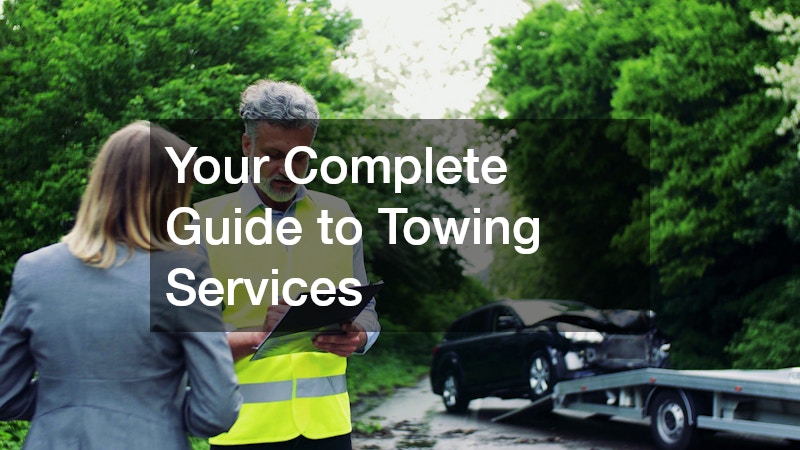
Towing services play a crucial role in vehicle transportation and roadside assistance. Whether you’re dealing with a breakdown, an accident, or need to relocate a vehicle, understanding towing services can save you time and stress. This guide will cover frequently asked questions, service types, and choosing the right provider.
What Types of Towing Services Are Available?
Light-Duty Towing
Light-duty towing is designed for small vehicles like motorcycles and cars. This service is ideal for breakdowns or minor accidents. Most light-duty towing services employ flatbed tow trucks or hook and chain systems that can handle these vehicles safely.
When a vehicle breaks down, quick assistance is necessary to avoid additional roadside hazards. Light-duty towing services are often available with quick response times to ensure you aren’t waiting long on the side of the road. In urban areas, these services are particularly in demand due to the high volume of smaller vehicles.
Finances play a significant role when choosing a towing service, and light-duty options are usually more affordable compared to heavier services. Factors like distance and vehicle type can impact the final cost, so it’s crucial to inquire about fees upfront. This transparency in pricing helps prevent any surprises when the bill arrives.
Medium-Duty Towing
Medium-duty towing caters to larger vehicles such as vans and small trucks. These vehicles require specialized equipment to handle the extra weight and size. By using more robust tow trucks, medium-duty services minimize the risk of damage during transportation.
In scenarios where a van or small truck experiences mechanical issues, immediate towing is often the safest choice. Medium-duty towing providers can offer flexible solutions for various situations. This versatility is beneficial when the specifics of the breakdown or accident create unique challenges.
Another advantage of medium-duty towing is its ability to serve in both urban and rural settings. The adaptability in location coverage makes medium-duty towing a preferred choice for service providers. Potential customers should check if such services are available in their area before necessity dictates their usage.
Heavy-Duty Towing
Heavy-duty towing services are suitable for buses, semi-trucks, and other large vehicles, ensuring safe transportation regardless of the challenge. Given the size and weight of these vehicles, heavy-duty towing is essential for minimizing further complications. This type of towing requires sophisticated equipment and highly trained operators.
Large vehicles like buses or semi-trucks are often subject to breakdowns due to their continuous usage. To facilitate quick recovery, heavy-duty towing companies invest in modern tow technology. This ensures that the towing process is efficient, even in the most challenging scenarios.
Choosing a heavy-duty towing service should factor in their reputation for reliability and safety standards. These providers often face emergency scenarios and must execute operations without delays. For companies relying on large fleets, establishing a relationship with a trusted heavy-duty towing provider is beneficial.
How Do You Choose a Towing Service Provider?
Experience and Reputation
Investigate the provider’s experience and online reviews to ensure they have a good reputation and can handle your needs efficiently. A company with years of experience usually indicates reliability and expertise in managing different towing situations. Customer reviews and ratings offer insights into the provider’s service quality and response time.
When selecting a provider, considering their specialization in handling specific vehicle types is critical. A well-regarded provider will have a strong track record of successful towing operations. This proven history demonstrates their capability to safely tow vehicles, regardless of the conditions.
Experienced providers often have better equipment and trained personnel, further ensuring the safety and efficiency of their services. Reliable towing services often emerge from providers who invest in continual training and equipment updates. Reputation and experience go hand in hand, creating a trusted service you can depend on.
Service Availability and Coverage Area
Check if their service area covers your location and if they offer 24/7 assistance for emergencies at any hour. Comprehensive service availability ensures that help can reach you promptly, regardless of the time or place. For individuals who often travel long distances, knowing that a provider’s coverage area spans multiple regions is reassuring.
24/7 service is particularly valuable in life-threatening emergencies or difficult road conditions. Availability around the clock reduces wait times and assures that you’re not stranded indefinitely. Carefully review the provider’s service coverage to confirm it’s adequate for your frequently traveled routes.
Some providers offer extensive networks, enabling them to operate across wider geographical areas. For businesses that manage logistics and transportation, having a towing partner with wide coverage is essential. It’s this large service area that provides peace of mind to drivers operations across varied locations.
Pricing and Transparency
Look for clear pricing policies and ask for quotes to avoid hidden fees or unexpected charges during the service. Transparent pricing allows you to plan financially, particularly during stressful conditions like vehicle breakdowns. A trustworthy provider will readily offer detailed quotes defining all costs involved in their services.
The tendency for hidden charges can turn a manageable situation into an expensive ordeal, further straining your resources. By considering upfront pricing, customers can compare different providers based on budget and service value. This step is crucial in strengthening consumer trust and preventing future disputes over fees.
Providers with known, transparent pricing policies often enjoy greater customer satisfaction and loyalty. When there are no surprises in the bill, customers feel valued and respected. Building a relationship with such a provider ensures continued reliable service in times of need.





